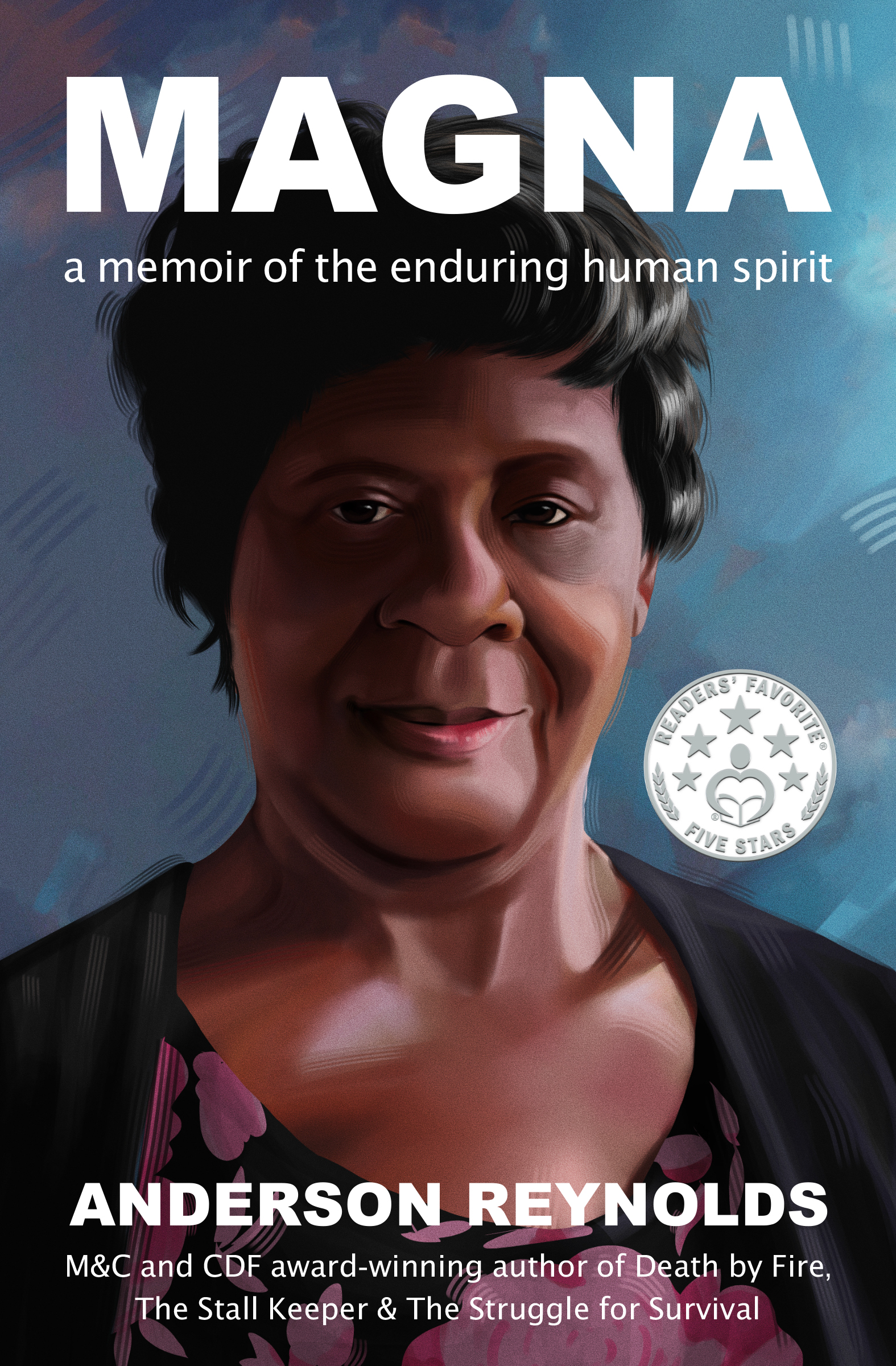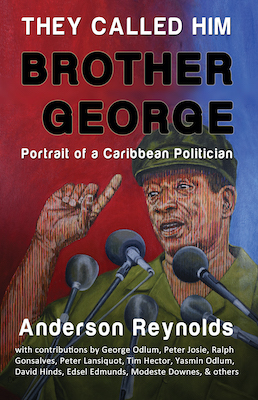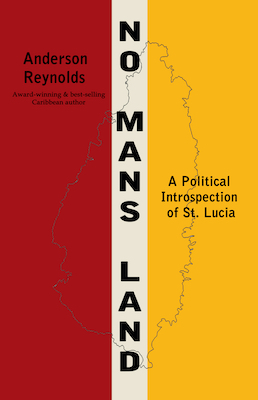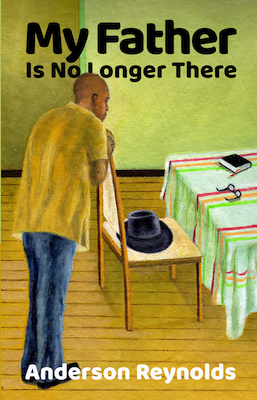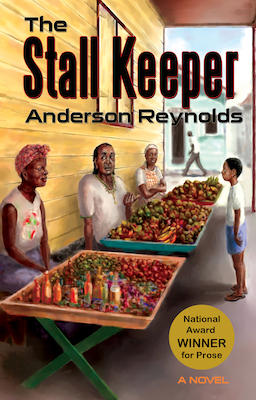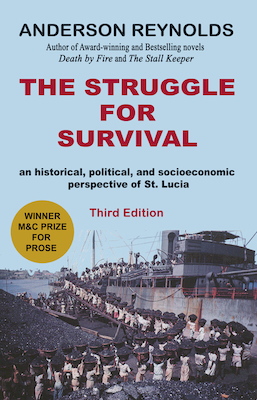“Informative, well-researched and artfully crafted work by a master in his field, arguably St. Lucia’s most prominent writer.”
— Modeste Downes, author of A Lesson on Wings

In No Man’s Land, economist and award-winning Caribbean author Dr. Anderson Reynolds dissects St. Lucian politics and society to pinpoint what is wrong with the country’s political system and how to fix it. It speaks to the hold history has on the country, and how race, partisanship, provincialism, and opportunism cloud the political process. It is a meditation on issues of patrimony, sovereignty, nationhood, corruption, and political empowerment. No Man’s Land provides a window into Caribbean politics and is a must read for anyone curious about how high the stakes of the 2021 St. Lucia general elections.
Book Trailer
Praise for No Man’s Land
“No Man’s Land is an informative, well-researched, and artfully crafted work by a master in his field, arguably St. Lucia’s most prominent writer. Digs deep into the meat of his country’s political system … a pointed and timely work highly recommended for political front liners, academics, students, and all interested in understanding and willing to help shape and re-shape the Caribbean and its attendant institutions.”
— Modeste Downes, author of A Lesson on Wings, Theatre of the Mind, and Phases
“No Man’s Land represents a substantial contribution to the public debate and further cements the author’s place as a serious and thoughtful public intellectual.”
—Dr. Prosper Raynold, economics professor at Miami University of Ohio
“A sword that pierces and cuts through both sides of the political realm, digs deep and bleeds out the truth which flows into a stream of solutions
—Alexander Clarke, business innovator
A no-holds-barred analysis of St. Lucia’s current political environment. This timely dissection of the anatomy of St. Lucia’s body politic is certain to ruffle a few feathers. Awesome… profound, informative, and thought-provoking.
—Dr. James Fletcher, former cabinet minister, a Chevening Global Changemaker, and author of Governing in a Small Caribbean Island State
Informative, thought-provoking, analytical but easy to comprehend. Reynolds’ narrative of St. Lucian politics past and present is informative, insightful, and gripping. As part of his introspection of St. Lucian politics, Reynolds distills complex research into digestible bites and provides compelling analogies to keep the reader satisfied. This book is a must-read for all and a reference text for St. Lucian expats.
—Stan Joseph, information systems specialist
Official Book Launch
Media Press News Interviews
Reviews
Peter Lansiquot
CARICOM economist and diplomat
I normally read Dr. Anderson Reynolds’ books in exciting but relaxed anticipation of what goodies each new chapter will bring. From Death by Fire, to The Struggle for Survival, through The Stall Keeper, and more latterly with My Father Is No Longer There, I have been the cool camper, just enjoying beautiful Saint Lucian literature depicting historical scenes, whether on economics, sociology, community commerce and development, or personal domestic endeavour and tragedy. Not this time though! For how could I be a cool camper when Dr. Reynolds suddenly disappears from the valley of the cool campers, and emerges on the plain of the politicians, sledgehammer and cout-la (cutlass) in hand, like Rambo unleashed, lashing out brutally and mercilessly at all perceived and real purveyors of economic and political corruption, whose “economic extraction” account for Saint Lucia’s persistent poverty, perennial and stagnant high unemployment, and the resulting protracted underdevelopment?
Let me warn Dr. Reynolds’ followers – literary critics and fawning fans alike – that No Man’s Land is indeed the valley of desolation implied by its haunting title. For Dr. Reynolds wields his clinical cout-la, shining in the blistering Saint Lucian sun, and stabs and slashes maniacally at the entire Saint Lucian body politic, exposing the corrupt and their unholy corruption. With his sledgehammer he shatters the ribs and the knees of lazy, fat-bellied officials and “crooks.” No corrupt politician is spared, and, as he surgically masticates their brains and sinews, the angry doctor aims the surgery theater’s brutally blinding light at the monumental ineptitude and incompetence of the present governing regime in Saint Lucia, and discovers, like many Saint Lucians have before him, that the Allen Chastanet regime, while hurling insults and invective at hard working Saint Lucian taxpayers, calling them “jackasses,” “mendicants,” “niggas,” “barking dogs,” etc., etc., is obviously playing dirty, nasty and dastardly games with the lives, the land, the patrimony and passports, the poor pensioners savings, and, generally, with the future of the people of Saint Lucia.
And lo and behold, as Dr. Reynolds descends again from the plain, having completed his surgery, and re-enters the valley of decision, he reminds all Saint Lucians what we had known long ago that constitutional reform is indispensable and vital to the real democratization and development of Iyanola, the land of the iguana. Individual politicians and political entities are too all-powerful for the greater good of the country, and their powers need to be curbed, and a critical democratic centralization of such powers is vital to truly broad democracy. As Dr. Reynolds completes this, his fifth masterpiece, a former Minister of Finance of Austria has just been sentenced by a jury of his peers to eight years in jail, for his past acts of corruption and the theft of the resources of the Austrian taxpayers. Saint Lucia’s turn is coming soon, I promise!
I once said the following about the author, in a particular context regarding his unique storytelling penchant: “In Dr. Reynolds, Saint Lucia has produced another writer of the calibre, or of even deeper essence than Nobel Laureate, V.S. Naipaul.” In this, his latest unapologetic, ferocious, take-no-prisoners assault on the nation’s top-level political honchos, I heartily embrace Dr. Reynolds’ evolution from the lofty plains of intriguing camp-site story-telling, into the gushing, turbulent, dizzying, de-chlorinated waters of the valley of Saint Lucia’s political abyss. Confronted by his patriotic onslaught, I also see my own evolution as a Saint Lucian politician (and a toddling literary critic), as I observe my own new capacity to respect an opinion or two that I may not necessarily endorse.
No Man’s Land is the personal and patriotic business of every Saint Lucian in the world, who has sung our national hymn, and who was taught that no matter where he or she “may roam,” we must “love, oh love, our island home.”
Dr. James Fletcher
Former cabinet minister, a Chevening Global Changemaker, author of Governing in a Small Caribbean Island State
No man’s land is a timely, unusual and important publication by Dr. Anderson Reynold’s.
Its timeliness is due to the fact that Dr. Reynolds is releasing this analysis of Saint Lucia’s political culture and environment on the eve of a general election in Saint Lucia. The book provides important reference points for the choices facing the Saint Lucian electorate when they go to the polls in a few months. There will be many who disagree with Dr. Reynolds’ analyses and quite a few who will disagree vehemently with some of the conclusions he has drawn, but this literary dive into our politics will cause the reader to stop, think and question, and that is always a good thing when deciding on the men and women who will lead our country for the next five years.
What makes this book unusual is that it represents a real-time analysis of Saint Lucian politics. The books that have been written on our island’s politics in the past have been historical reflections of events and circumstances that took place several years prior to the publication of the respective books. Anderson Reynolds examines issues that recently took place, many of which are still being debated and prosecuted in the court of public opinion. The contents of this book are not events that you have to strain to recollect. They are contemporary events, and No Man’s Land allows you to compare your understanding and interpretation of the cause and effect of these events with that of the author.
This is an important publication because Dr Anderson Reynolds addresses myriad significant subjects in the book. He treats with a range of critical topics, from the reform of our constitution to the representation of his constituency. His analysis of the merits and demerits of our two most recent prime ministers will provoke a furious debate both inside and outside of both political parties.
No Man’s Land ends with a statement on “the need for change”, which I believe is the overarching theme that Anderson Reynolds is seeking to convey. My point of departure with Dr. Reynolds, however, is his reliance on Constitutional Reform as the vehicle for this change. While strengthening our constitution and making the respective arms and institutions of government function more efficiently and effectively, with a dilution of the omnipotence of the prime minister, is certainly a good and necessary thing, there is much that also needs to be done with respect to changing the culture of our politics and the trajectory of our development. Hopefully, this will be the subject of the next book or books by Dr. Anderson Reynolds or some other Saint Lucian author.
Thank you, Dr. Anderson Reynolds, for another important contribution to Saint Lucian literature and politics.
